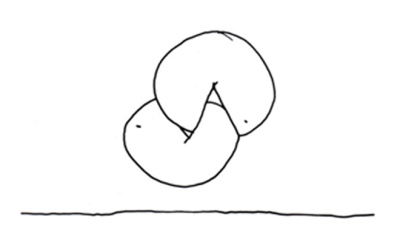
Actualising Love
“Race” and “race relationships” is a big issue on Planet Earth, is it not? Every day, in nearly every newspaper in every country, there are articles about race and race relations. We humans have somehow created a big semantic issue out of this. And as a result, it has given rise to prejudice, judgments, stereotypes, hatred, race crimes, exclusions and so on.
Yet all of this is a hoax. A hoax pure and simple!
A hoax? Yes, a hoax! It is an invented issue. It is an issue that is false and erroneous and mythological. How can I say such? Because there is no such thing as “race.” At least not on this planet.
Before you think I’ve lost my mind, let’s define what we’re talking about. “Race” implies that there are different species of people and that somehow we are basically different. Even the dictionary’s definition for race attempts to make this point. Race: “a family, tribe, people or nation belonging to the same stock.” That’s more mythology. On planet Earth there is only one stock of people, one race. We are all from the same family, the same species. In this, there are no “other” races; there is just one— there is just the human race.
There is Just One Race — The Human Race
I first picked this up from Alfred Korzybski when I was reading his classic book, Science and Sanity (1933/ 1994). In that work he constantly referred to the various “racial” qualities of people. In this, he used the term “racial” constantly and it took me awhile to figure out what he was referring to.
At first, I really didn’t know what he was referring to. “Racial” to me had always meant the other races. But eventually I realised that he was talking about the human condition. Then it dawned on me; there are no “other races.” There is only one race—the human race to which we all belong.
While I described this as dawning on me, if that sounds like an immediate insight that struck me out of the blue and totally changed my thinking and feeling in one fell swoop, well, it was not like that. The transformation was much slower. Slowly I became aware that what we call the different “races”, are but different families. Different family distinctions.
In this, the differences between the different groups, nationalities and peoples, are actually hardly important or significant—colour of skin, shape of mouth, nose, eyes, etc. We all say of newborn babies, “She’s got her mother’s eyes” or “He’s got his grandfather’s nose.” In a similar fashion to these family traits, what we have called “racial” distinctions, are but family traits that large families carry on – nothing more. They are not actually “racial” differences, since we are all part of the same race—the human race.
Racial Semantic Reactions
If there are no other races, and if our differences are just family differences, and differences from the different ways we have been cultivated (e.g., our cultural differences), then what’s all the fuss?
- Why hate these minute differences?
- Why the suspiciousness, judgments, prejudices, etc. of differences in the human condition?
- What stops us from loving all members of the human race?
- What prevents us from being kind and gracious to our brothers and sisters of the same human family?
Ultimately the problems in these areas arise from the meanings that we give to these differences. And it begins from even our use of the term “race.” As long as we talk about races as if there are different races, we solidify in our mind the differences and make them more real and permanent. So as a simple way to begin, what if we simply drop the term “race” altogether and talk about the human family? That would help us to humanise each other, rather than create a false-to-fact distinction between each other as if our family differences arise from being different species of human.
As we stop creating linguistic gulfs between the family distinctions – between those of the human race, we can then change the meanings that we give to our differences. This goes to culture. And while “culture” sounds like a thing, a real and objective thing, it is not. It is only a process— the process whereby we cultivate our minds, emotions, speech, and behaviours.
Now given that we are born without instincts for how to be human, we need a human family or community to help us learn. We call that family or community a “culture”, because it is within that learning environment that we pick up on how to think, feel, speak, and act. That community cultivates us as it civilises us to learn the human way of responding. And obviously, some families are healthier and more functional, more accurate, and more enhancing than others. So some cultures are more effective in helping us actualise the full human potential than others. Yet there is no perfect culture. Every culture simply offers some ways of cultivating our thinking, valuing, believing, understanding, caring, loving, etc. in ways more fitting to reality than others. And all are full of human misunderstandings, myths, and limitations. All are human and so all are fallible, erroneous, and full of silly things, ridiculous things, stupid things, and hurtful things. All of them.
Problems between people of different cultures begin, when we juxtapose one culture against another in an either/or format. The truth is that it is more a matter of degree and extent. Some cultures are better in terms of facilitating business acumen, others in terms of financial well-being for all peoples, others in terms of compassion, understanding, being present in the moment, planning for the future, empowering people, learning, etc.
And within almost every culture (any culture of any size) there are multiple sub-cultures. This is just the way of us humans. In my American culture, there are perhaps hundreds, if not thousands of sub-cultures. And some are very toxic, destructive, and pathological. I’m now thinking about the culture of violence, the culture of drugs, the culture of victimhood, the quick-to-sue and litigate culture, the Hollywood culture, the beauty culture, and the list goes on and on. Equally, there are many healthy, loving, empowering, and life-enhancing cultures: the quality culture, the culture of self-development, the culture of ongoing learning, the culture of compassion, etc.
When we go to the business culture inside of national cultures, we see that there are cultures of old-money and status, bureaucratic culture, might-is-right culture, don’t-be-the messenger of bad news culture, and there are equally democratic cultures, cultures of respect, meritocratic cultures, mentoring cultures, coaching cultures, etc.
Transcending Culture and Race
How then do we actualise love between people? To do so we need to transcend our mythological ideas about “race” and transcend our own enculturalisation. And we do that by embracing all of humanity, acknowledging all human possibilities, and recognising the value in differences. We do so also by recognising that all “cultures” are just historical and traditional ways of being and all are contaminated with human fallibilities. Then, recognising this, we can make the issue, not “holding true” to old cultural ways, but how to create new and more effective “cultures” that will cultivate the minds and hearts, speech and behaviours of humans, so that we can actualise our highest and best.







